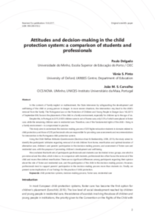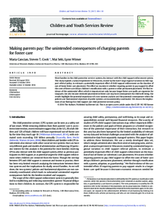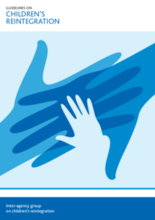Displaying 121 - 130 of 232
This study aims to understand the decision-making process of 200 higher education students in domains related to child protection, and those of 200 professionals who are responsible for providing case assessments and recommendations for intervention in the Portuguese child protection system.
The present study tested whether family finding, as implemented in North Carolina from 2008 through 2011, improved child welfare outcomes for youth at risk of emancipating foster care without permanency.
This study examines whether requiring parents to pay child support to offset the costs of foster care delays children's permanent placement, whether through reunification with a parent, adoption, or guardianship.
This study evaluates one mid-Atlantic state’s implementation of a FGDM called family involvement meetings (FIMs) to improve family strengths and their active engagement in the service planning process.
These Guidelines build on several existing care policies, including the UN Convention on the Rights of the Child.
This paper analyzes the concluding sections of assessment reports on applicants for intercountry adoption in Sweden to answer the following question: what must be said about an individual or a couple in order for her/them to be seen as a suitable adoptive parent?
This paper presents findings from a doctoral project that explored the experiences of young people growing up in foster care in the United Kingdom.
Compared to children in other placements, there is much less known about the characteristics and needs of children in the UK who are returned to their birth parents with a care order still in place.
This exploratory research involved focus group consultations with seven child and family welfare agencies to investigate the impacts, barriers, benefits and limitations of cultural support planning for Indigenous young people in, and leaving care in, Victoria.
This three-part video series shows how a fictional organization, Greene County Department of Human Services, set out to improve permanency for children and youth by increasing the number of available foster and adoptive homes using data-driven decision making (DDDM).



